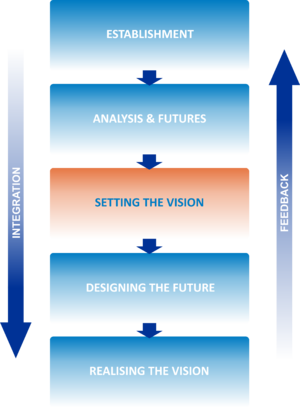The ICZM Process - a Roadmap towards Coastal Sustainability - Setting the vision
| Introduction |
|
Establishment |
|
Analysis and Futures |
|
Setting the Vision |
|
Designing the Future |
|
Realising the Vision |
|
Contents
The overall aim of the Setting the Vision stage is to engage the stakeholders in the identification of the key problems and issues for the ICZM Process to deal with, and to set the course for the eventual “shape” of the strategy, plan or programme and its implementation. It will build on and substantiate the findings of the Establishment and Analysis and Futures stages.
Key tasks
- Consensus Building - agreement among stakeholders and the wider community on the key problems, issues and priorities for the area .
- Setting the Direction - agree on the vision for the area, the priorities and the consistency of the objectives of the strategy, plan or programme.
- Measuring Success - selecting the indicators to measure the success of both the ICZM Process and its outcomes.
Potential Outputs
A single Vision Statement including priorities and objectives, along with supporting interpretive material and reports of the participation process, as well as the Indicator Matrix (to be "populated" throughout the following stages of the ICZM Process and its implementation).
A vision should be both rational and inventive:
"Prospective is above all an attitude of mind … and a way of behaving…. If it has no future direction the present is empty of meaning.... The rational and the inventive trends of strategic planning are complementary, only prima facie they seem opposite."
(Godet, M. 1987. Scenarios and Strategic Management, Butterworth: London)
See Also
Go to next stage: Designing the Future
Please note that others may also have edited the contents of this article.
|

